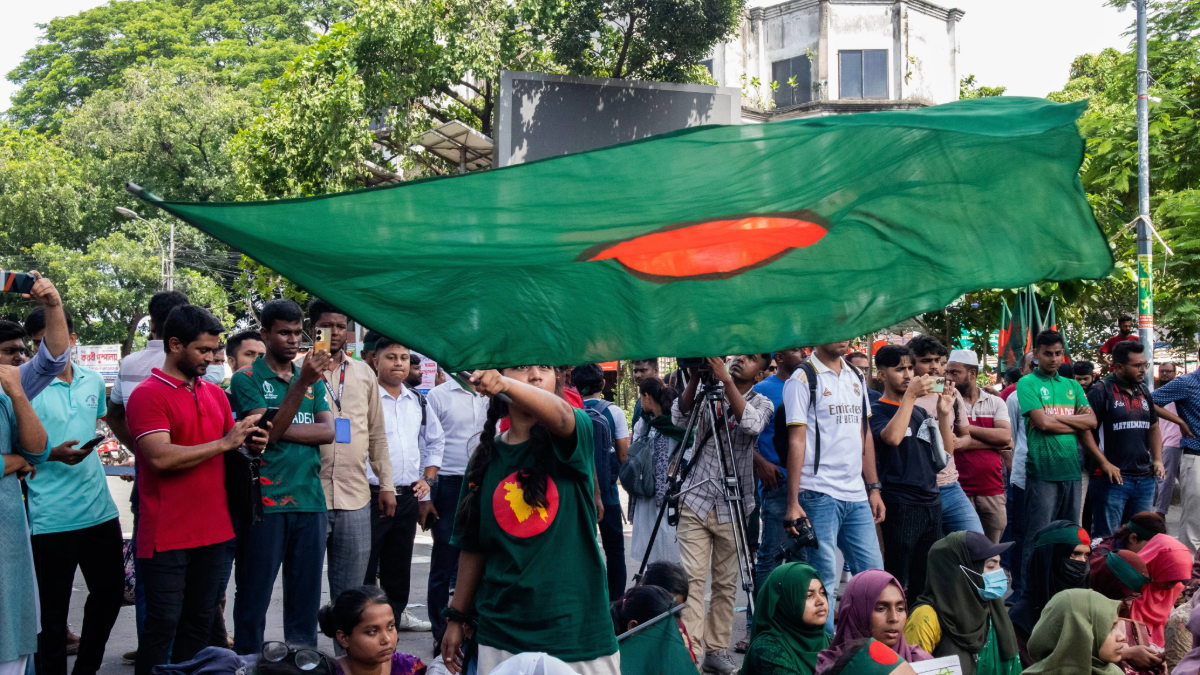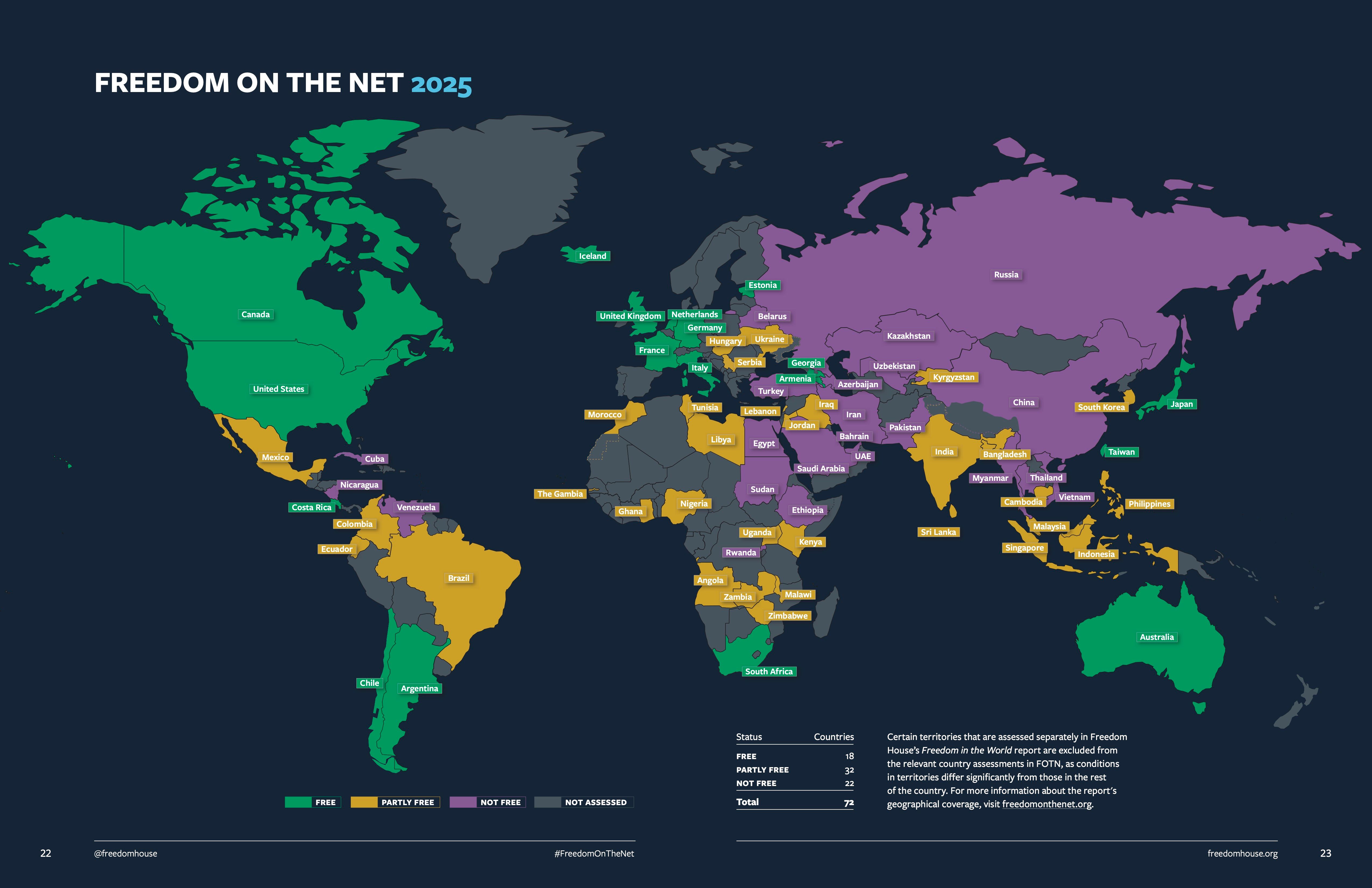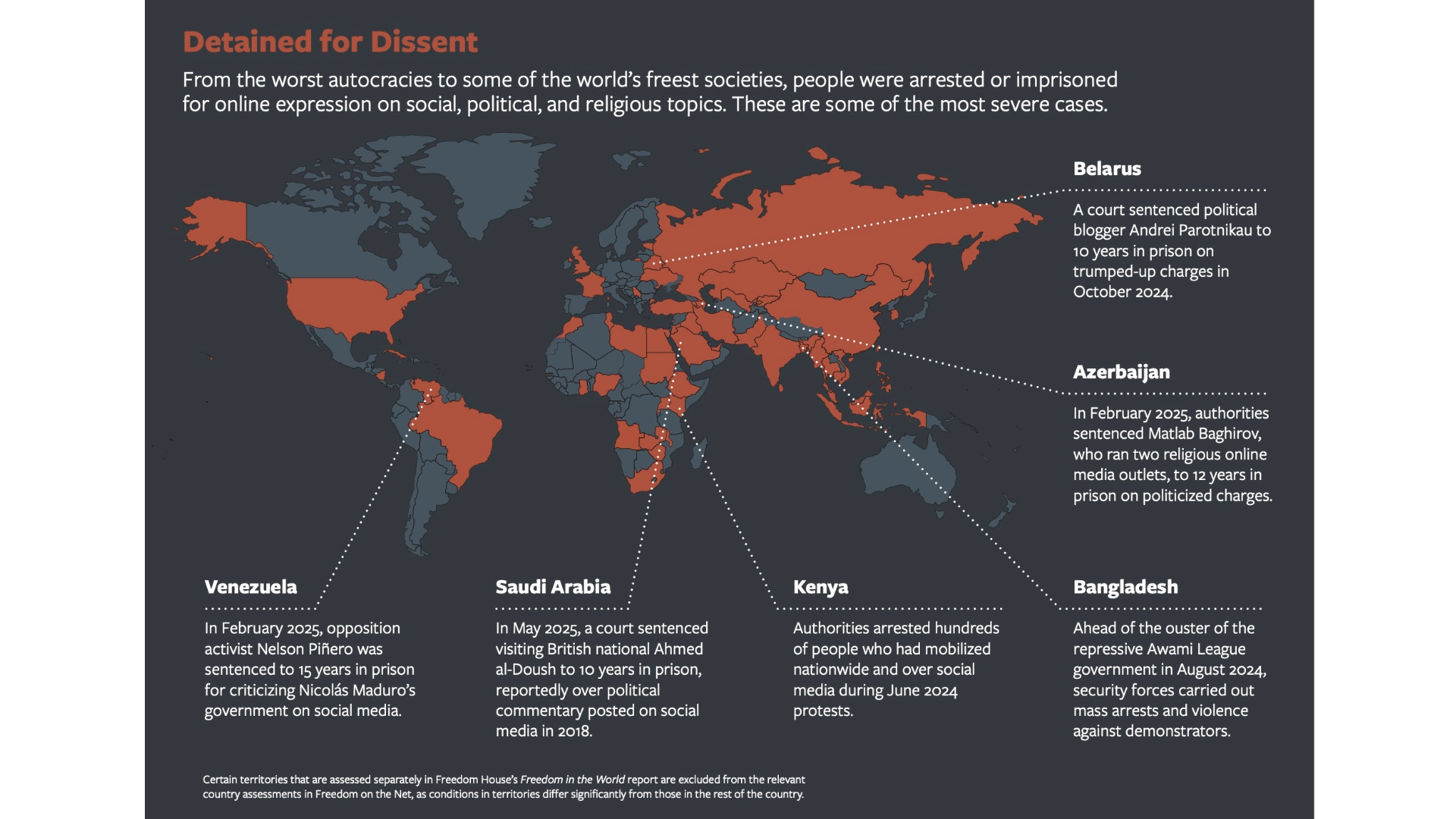Global Internet Freedom Declines for 15th Consecutive Year
Prithvi Iyer, Justin Hendrix / Nov 13, 2025
July 10, 2024. Dhaka, Bangladesh. Students protest near Dhaka University. Bangladesh “earned the year’s strongest improvement" in the annual Freedom on the Net report from Freedom House, "as a student-led uprising ousted the country’s repressive leadership in August 2024.” Shutterstock
Since Tech Policy Press launched nearly five years ago, it has made a habit of reporting on the findings of the annual Freedom on the Net report from Freedom House, the nonprofit organization founded in 1941 to advance democracy and human rights.
The report is always grim reading. In 2021, it was titled “The Global Drive to Control Big Tech.” In 2022, it was “The Global Expansion of Authoritarian Rule.” In 2023, “Advances in Artificial Intelligence Are Amplifying a Crisis for Human Rights Online.” And last year, it was “The Struggle for Trust Online.” Each year, the report chronicles governments suppressing dissent, tells the stories of people arrested for nonviolent expression, and tallies those attacked or killed for their online activities, in addition to the increasing number of internet shutdowns, challenges to encryption policies, and other more mundane threats to internet freedom.
For years, the report was substantially funded by the United States government under its portfolio of projects to advance democracy and human rights around the world. That portfolio has been decimated under the Trump administration. Freedom House itself has suffered layoffs, as cuts to State Department-funded democracy and internet freedom projects “severely impacted” the organization. As an announcement put it earlier this year:
On January 20, 2025, the Executive Order on Reevaluating and Realigning United States Foreign Aid froze all programs funded by US foreign assistance and ultimately led to the termination of more than 80 percent of Freedom House’s programs and activities in more than 140 countries—including projects that supported, directly and indirectly, lifesaving measures for human rights defenders and political prisoners. As a result, Freedom House has had to lay off a large portion of its staff and end its work on vital projects that were relied upon by policymakers, business leaders, civil society organizations, front-line activists, and the general public.
The Freedom on the Net project was among the projects affected by the cuts. And yet, the 2025 Freedom of the Net report is out today.
“We are really fortunate to still receive support from people and organizations who care about freedom of expression, privacy, and access to the internet,” one of the report’s authors, Kian Vesteinsson, senior research analyst for technology and democracy at Freedom House, told Tech Policy Press.
Vesteinsson said this year’s report was funded with a mix of support from public and private sources, including foundations and individuals who maintained or stepped up their giving. Following the cancellation of government funding, the organization had to terminate its longstanding contracts with researchers and reformulate the project.
“We could not have done this without the community of researchers and experts who are deeply committed to human rights online,” said Vesteinsson.
More bad news
Once again this year, the findings are sobering, yet unsurprising. For the 15th consecutive year, global internet freedom is in decline—so much so that the title of this year’s report is “An Uncertain Future for the Global Internet.”

Authoritarians are gaining ground. Source: Freedom on the Net
Of the 72 countries assessed in this year’s report, internet freedom declined in 27, with Kenya reporting the largest decline. Bangladesh, on the other hand, “earned the year’s strongest improvement, as a student-led uprising ousted the country’s repressive leadership in August 2024.” China and Myanmar remain the “world’s worst environments for internet freedom,” while Iceland was found to have the freest online environment.
Here are the other key findings:
- Nine of the 18 countries designated as “Free” experienced declines in internet freedom during the study period from June 2024 to May 2025. Georgia had the largest decline from this group, followed by Germany and the US.
- Alarmingly, citizens in “at least 57 of the 72 countries covered by Freedom on the Net 2025 were arrested or imprisoned for online expression on social, political, or religious topics during the coverage period—a record high.”
- Countries including Egypt, Pakistan, Russia, Turkey, and Venezuela, which have suffered the most extreme declines in internet freedom in the last 15 years, have further intensified their control over online speech. Authorities in these countries have “escalated surveillance of electronic communications, and imposed more severe penalties on those who expressed dissent online, particularly during protests and elections.”
- Digital spaces are being increasingly manipulated. Of the 21 indicators assessed by this report, the indicator for online deception “has undergone the most consistent global decline over the past 15 years.” AI-generated content and online influencers posting pro-government content without adequate disclosures have seen a significant uptick. According to the report, 70% of the world’s population now lives in countries where governments sought to manipulate online content.
- This year’s report also examined how growing investments in domestic AI industries shape digital rights and found that online anonymity is “entering a period of crisis” due to the widespread adoption of identity verification technologies, which in some cases is driven by the “legitimate aim of protecting children.”
Beyond these top-level findings, the report offers important takeaways on democracies where there have been substantial political developments in the past year, including the US, Brazil, and India.
United States
The US retained its "free" status but experienced one of the most significant declines among democratic countries. According to the report, this was partly due to the Trump administration’s decision to detain foreign nationals “for one to two months after revoking their visas over nonviolent online expression, as part of a larger program to arrest and deport noncitizens.” The report also notes that the Federal Trade Commission (FTC) and the Federal Communications Commission (FCC) conducted “politicized investigations” into media outlets and technology companies, often targeting their content moderation practices and editorial decisions, including speech protected by the First Amendment. And of course, the US also decided to dismantle foreign aid, with funding cuts directly impacting programs aimed at addressing digital repression and censorship in authoritarian countries.

Dismal company: the US is among countries such as Saudi Arabia and Venezuela where individuals have been arrested or imprisoned for online expression. Source: Freedom on the Net
Brazil
The report’s Brazil component explores how information manipulation in the country has evolved from crude propaganda to sophisticated influence operations. For instance, researchers in Brazil “uncovered a sophisticated network that was manipulating online narratives on behalf of former President Jair Bolsonaro.” This was facilitated through influencers and media outlets on WhatsApp, YouTube, and Telegram to convey a sense of authenticity. The researchers found that the network’s reach “enabled the Bolsonaro camp to shape online discussion in his favor during moments of political crisis.”
On AI infrastructure, the Brazilian government announced “a $4 billion investment plan for sovereign AI that would reflect the country’s values; some $1 billion of the funding was allocated to state-owned technology firms.” Brazilian civil society organizations are urging the government to embed fundamental rights safeguards into AI governance frameworks from the start, rather than retrofitting protections later.
India
India continues to have a “partly free” status, ranking 51st out of 73 countries assessed. The online information environment in India is rife with misinformation and misleading content, the report says, especially in the aftermath of the terrorist attack in Kashmir that saw military conflict between India and Pakistan. Influencers and government-backed entities from both countries “posted waves of inflammatory and escalatory AI-generated content, drowning out reliable sources of news and information.”
In August 2025, after the report's coverage period, Indian officials reported that Starlink had agreed to store local users' data within India, complying with Indian law. The action came in response to the government’s probe into the unlawful use of the satellite service in January. On privacy, the report indicates that third-party databases associated with India’s Aadhaar system experienced numerous data breaches, resulting in millions of Aadhaar numbers being leaked and leading to increased fraud and cybercrime.
Looking forward
Based on this year’s findings, the report offered important recommendations to improve the status of digital rights worldwide, including:
- Democracies should work to create “interoperable privacy regimes” that protect user information and enable cross-border data flows.
- There should be a “whole of society” approach to fostering information integrity online, based on the recommendations from “The Global Declaration on Information Integrity Online.”
- Governments must ensure digital services and internet connectivity are maintained, especially in times of unrest and conflict, while also ensuring that safe harbor protections for intermediaries are maintained “for most of the user-generated and third-party content appearing on platforms, so as not to encourage these companies to impose excessive restrictions that inhibit free expression.”
Veisstenson, who has worked on the Freedom on the Net report for five years, said Freedom House is still assessing how to continue to deliver the research each year, given the funding cuts. But, he said, “Freedom House remains deeply committed to our portfolio of work around technology and democracy.”
“We are in a moment of really rapid technological transformation where investments in AI lead the headlines in almost every publication every day,” said Veisstenson. But, he said, there is a need to focus on democratic principles and the basic promise of a free and open internet. As authoritarians continue to gain ground, he urged governments and corporations “to come back to these baseline principles around safeguarding freedom of expression and making sure privacy is protected.”
The full Freedom on the Net 2025 report, including detailed country assessments and methodology, is available here.
Authors

